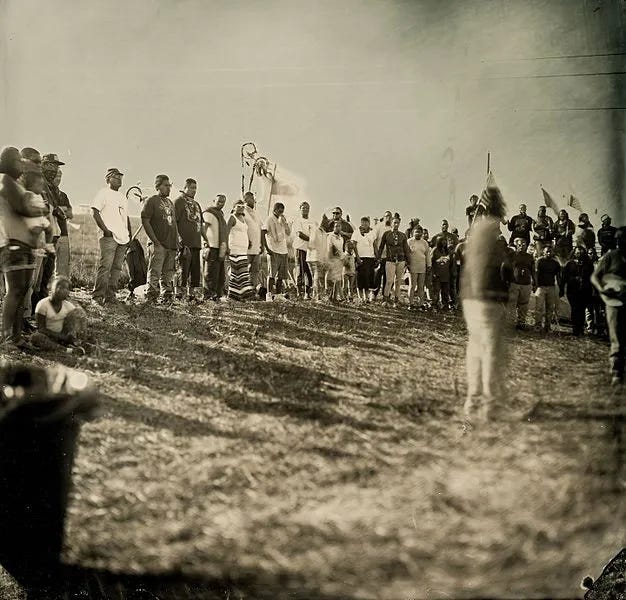Killing Free Speech to Silence Environmental Activism and Public Protest
A North Dakota jury with links to the fossil fuel industry just delivered a huge blow to American’s rights to free speech and public protest. Who will be next?
In the wake of the news that the Trump administration was seeking to deport Palestinian activist Mahmoud Khalil the week before last, a North Dakota jury with ties to the fossil fuel industry found Greenpeace International liable for more than $660 million in damages in a case designed to shut down protest and muzzle dissent across the country.
As Greenpeace reported leading up to this judgement:
Energy Transfer is suing Greenpeace for $300 million over protests related to the Dakota Access Pipeline. The lawsuit, first dismissed in federal court, has been refiled in North Dakota state court and seeks to hold Greenpeace responsible for actions taken by unaffiliated individuals and for repeating statements made by others. This case is a textbook example of a SLAPP [Strategic Lawsuit Against Public Participation] suit: a legal strategy meant to financially drain and silence organizations that engage in advocacy and dissent.
This lawsuit is about much more than Greenpeace. It is a test case for whether corporations can use the legal system to suppress public protest and speech. If successful, it could open the door for legal action against unions, journalists, and advocacy groups whenever their speech inconveniences corporate interests.
These kinds of SLAPP cases are illegal in some states and countries but legal in North Dakota; hence Energy Transfer’s efforts to keep the case there, where they had the help of a hostile jury and a rightwing media campaign against protesters. In sum, Energy Transfer hoped to succeed in overwhelming Greenpeace with a well-funded effort in a state where the deck was heavily stacked against activists.
And, at least for now, the fossil fuel industry has won with the Guardian reporting that:
A jury in North Dakota has decided that the environmental group Greenpeace must pay hundreds of millions of dollars to the pipeline company Energy Transfer and is liable for defamation and other claims over protests in the state nearly a decade ago.
Energy Transfer Partners, a Dallas-based oil and gas company worth almost $70bn, had sued Greenpeace, alleging defamation and orchestrating criminal behavior by protesters at the Dakota Access pipeline in 2016 and 2017, claiming the organization “incited” people to protest by using a “misinformation campaign”.
Greenpeace, which had denied the claims, said in a statement after the verdict that lawsuits like this were aimed at “destroying the right to peaceful protest”; constitutional rights experts had expressed fears that the case could have a wider chilling effect on free speech.
The Standing Rock Sioux, who were at the heart of this historic struggle that brought in allies from across the country to uphold indigenous rights and the survival of the planet, sees the effort for what it is: “an attempt to silence our Tribe about the truth of what happened at Standing Rock, and the threat posed by DAPL to our land, our water and our people. The Standing Rock Sioux Tribe will not be silenced.”
Labor unions also stood with Greenpeace, with many signing on to a letter observing that:
As unions and organizations that represent workers who engage in all sorts of free expression - through advocacy to elected officials, social media, and in person pickets and protests - we are deeply concerned about the rise of lawsuits brought by corporations against people and organizations exercising first amendment rights of free speech and freedom to assemble. We believe these types of suits are meant to silence citizens and organizations and prevent us from calling out injustice where we see it.
Energy Transfer’s $300 million lawsuit against Greenpeace related to protests around the Dakota access pipeline is one of the more recent examples of this. While many union members work on pipelines, and many disagreed with the content of the protests, we are united in our wholehearted support of the right to protest.
Just as unions, indigenous groups, and civil libertarians have supported Greenpeace in their efforts to defend themselves against a lawsuit that seeks to muzzle free speech and protest, so too should anyone who still believes we ought to have these foundational rights in American democracy.
The verdict will be appealed and fought in higher courts, so the struggle is far from over. Nor has the larger battle ended that the Greenpeace case points to, the effort to maintain basic rights in our society. With momentum building week after week for the oligarchs, it’s not hard to see where the billionaire class, corporate America, and their allies in the Trump administration and the courts want to take the country—back to a time when the first Chief Justice, John Jay, proclaimed that “Those who own the country ought to govern it.”
It took a couple hundred years of gradual social, economic, and political transformation to get us to a place where a more inclusive vision of democracy at least partially held sway, but that tentative victory for a broader, largely egalitarian America was always temporary, only as true as we wanted to make it. Now, with the plutocrats emboldened and the authoritarians in the White House full of passionate intensity, things many folks thought would never happen again are happening again.
How many more dominoes need to fall before a broader swath of the American public starts to pay attention? We can’t just wait for the midterms. The time to speak up is now, in every state, city, and town in the United States.
Originally posted at:





